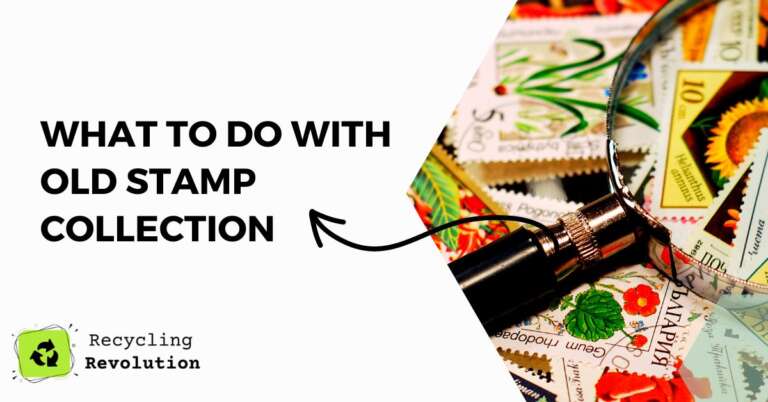Stamps: the petite pieces of adhesive paper that often get ignored in the bustling age of email and instant messaging. They represent our world’s rich history, art, culture, and have served as a silent witness to the evolution of global communication.
If you’ve inherited or stumbled upon an old stamp collection, you might be wondering about its value, its significance, and most importantly, what to do with it.
tl;dr: If you’ve found yourself with an old stamp collection, consider first assessing its value, then decide on either selling, donating, preserving, or upcycling it. The best choice largely depends on your personal goals and the collection’s significance.
Discovering the Value
Before doing anything with your collection, it’s crucial to have a sense of its value.
Consult a Philatelist: A philatelist is someone who studies stamps. They can provide a wealth of information about the history and significance of your stamps. I recommend consulting with a professional philatelist to get a fair assessment.
Use Online Platforms: Websites such as Stanley Gibbons, SCB, and Colnect can provide approximate values for stamps based on their current market prices.
Note: Always cross-reference between multiple sources for an accurate estimate.
Selling Your Collection
If you’ve discovered that your collection has a considerable value, selling might be an enticing option. Here’s how:
Auction Houses: Renowned auction houses, like Sotheby’s or Christie’s, often have special sections for stamps and postal history. These platforms attract serious collectors who might be willing to pay top dollar for rare pieces.
Stamp Dealers: Engage with local or international stamp dealers. These professionals often buy collections to resell individual stamps to other collectors.
Online Platforms: Websites such as eBay provide a platform to sell to a global audience. Ensure you have clear photographs and detailed descriptions for potential buyers.
Donating Your Collection
For those who see stamps as more than just monetary assets, donating is a heartwarming option.
Schools and Educational Institutes: Stamps can be great teaching tools. Consider donating to local schools, colleges, or universities that might use them in their history or art curricula.
Museums: Many museums have sections dedicated to philately. A donation here can ensure that your collection becomes a part of recorded history.
Charities: Some organizations accept stamp collections and sell them to raise funds for charitable causes.
Preserving the Collection
If you’ve grown fond of the collection and want to cherish it, preservation is the way to go.
Proper Storage: Store your stamps in a dry, cool place. Avoid direct sunlight, which can cause the colors to fade.
Stamp Albums: Invest in high-quality stamp albums. I recommend albums with acid-free pages to prevent any damage.
Note: Regularly check for signs of mold, pests, or any deterioration.
Upcycling and Repurposing
If you’re feeling crafty and creative:
Craft Projects: Stamps can be incorporated into various DIY projects like scrapbooks, greeting cards, or framed artworks.
Jewelry: With a bit of creativity, stamps can be turned into unique jewelry pieces like pendants, earrings, or brooches.
Home Décor: Framing and displaying stamps can give your home a vintage, artistic touch.
Scientific Stats and Studies
Stamp collecting, or philately, isn’t just a hobby; it has genuine cognitive and emotional benefits. A study published in the Journal of Geriatric Psychiatry pointed out that philately can help in improving attention to detail, cognitive flexibility, and memory functions. Moreover, according to the American Philatelic Society, engaging with stamps can provide therapeutic relaxation, much like meditation.
Engage with the Philatelic Community
Before deciding what to do with your old stamp collection, it’s beneficial to immerse yourself in the world of philatelists.
Join Philatelic Clubs or Societies: Engaging with fellow stamp enthusiasts can be a great way to learn more about your collection. Many clubs hold regular meetings, seminars, and exhibitions. The American Philatelic Society, for instance, is a vast network of stamp enthusiasts that provides resources and information to its members.
Attend Stamp Shows: These events can be a fantastic way to see how other collectors display their stamps, understand current market trends, and meet potential buyers or dealers. You might even find stamps that can complement or complete your collection.
Educate Yourself
Understanding the background, history, and narrative of your stamps can add to their value, both monetary and sentimental.
Philatelic Libraries: Some major cities have libraries dedicated solely to philately. These can provide an in-depth look into the origin, history, and significance of your stamps.
Online Courses and Workshops: The digital age has brought philately to your fingertips. Many platforms offer courses ranging from beginner to advanced levels. I recommend checking out resources like the Universal Philatelic University for structured learning.
Restore and Repair
If you’ve got older stamps that seem to be in less-than-perfect condition, consider restoration.
Professional Restoration: For stamps of significant value, it might be worth investing in professional restoration. Experts can carefully remove stains, mend tears, and even address issues like perforation or fading.
DIY Care: For less valuable or more abundant stamps, you can engage in light cleaning and preservation at home. However, always research and understand the methods before attempting to avoid causing further damage.
Note: Always weigh the cost of restoration against the stamp’s potential value. Over-restoration can decrease a stamp’s value in the collector’s market.
Digitize Your Collection
In the age of technology, having a digital footprint of your collection can be beneficial.
Scanning and Photographing: Create high-resolution images of your stamps. This not only serves as a digital record but also aids in online sales, sharing with other enthusiasts, or even insurance purposes.
Cataloging Software: There are software and apps designed to catalog stamp collections. They allow you to record details, track your collection’s growth, and monitor market values. Platforms like EzStamp are popular choices among collectors.
Insure Your Collection
If your collection holds significant value, either sentimentally or monetarily, insurance is a prudent step.
Specialized Insurance: Some companies offer insurance tailored for collectibles, including stamps. They provide coverage against theft, damage, or loss.
Note: Regularly update the value of your collection to ensure adequate coverage.
Gift or Bequeath Your Collection
If you’ve grown fond of your stamps and want them to stay within the family, consider passing them down.
Legacy: Stamps can become family heirlooms, carrying stories from one generation to the next. Sharing the collection’s history and significance can instill a sense of pride and continuity.
Educational Gifts: Gifting to younger family members can be a great way to ignite a passion for history, art, or collecting in them.
In the vast and intricate world of philately, every collection tells a story, and every stamp adds a chapter.
The journey you decide for your old stamp collection, whether it’s diving deeper into its tales, sharing its wonders, or ensuring its longevity, can be as enriching as the history imprinted on each stamp.
Conclusion
The journey with an old stamp collection can be as adventurous as the tales each stamp tells.
Whether you choose to cash in on their monetary value, donate them for a greater cause, preserve them for future generations, or upcycle them into crafty creations, the most important thing is to respect their historical and artistic significance. Stamps, after all, are tiny windows into our world’s vast and varied past.
FAQ
How do I know if my stamp collection is valuable?
Consult a philatelist, use online platforms, and cross-reference to get a rough estimate of its worth.
Can I donate my collection?
Absolutely! Schools, museums, and charities are potential places where your collection can find a new purpose.
Is stamp collecting beneficial?
Yes, philately has been scientifically linked to cognitive benefits and emotional relaxation.
Note: Always handle stamps with care and consider getting insurance for extremely valuable collections.

